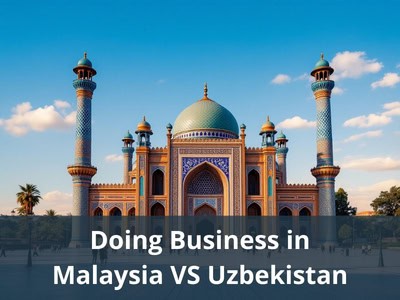Ready to Expand into India? Choose 3E Accounting Today!
Stay Secure, Stay Successful With 3E Accounting Services

This comparison outlines the core differences between Malaysia and Uzbekistan to help you decide which one aligns best with your business strategy.
Here’s a quick overview of the key differences for easy reference.
| Key Factors | Malaysia | Uzbekistan |
|---|---|---|
| Business Environment | Stable, investor-friendly, transparent | Reforming, improving, but evolving |
| Corporate Tax Rate | 24% | 15% |
| Capital Gains Tax | No capital gains tax for individuals | Applies to specific transactions |
| Ease of Incorporation | Fully digital, fast, foreigner-friendly | Simplified, but slower processing |
| Business Costs | Low, scalable, developed infrastructure | Low labor cost, higher logistics barriers |
| Market Access | ASEAN, global FTAs, logistics-ready | Central Asia, limited trade reach |

Selecting the right partner is crucial when it comes to starting a business in Malaysia. At 3E Accounting, we offer a comprehensive range of solutions designed to simplify the entire process of company incorporation in Malaysia. From ensuring compliance with local regulations to providing expert guidance tailored to your specific needs, we make the journey seamless.
For entrepreneurs looking to navigate Malaysia company registration or explore company setup in Malaysia, our team provides unmatched expertise and support. Additionally, our company incorporation services are tailored to help you succeed in the competitive business environment.
With a deep understanding of the region’s business landscape, we also provide resources for setting up businesses in Malaysia, ensuring that every step is clear and efficient. Whether you need assistance with corporate secretarial or company secretary services, we are here to help.
To explore our services or discuss your business needs, contact 3E Accounting. With our strong presence in Malaysia and a proven track record, we are your trusted partner for success in Asia.
Stay Secure, Stay Successful With 3E Accounting Services
Answer: Malaysia offers more regulatory stability and global market access, making it ideal for long-term planning. If you’re considering starting a business in Malaysia, it’s a strategic base for expansion.
Answer: Malaysia provides a fully digital, transparent, and efficient incorporation process. See the full process in the Malaysia company registration guide.
Answer: Uzbekistan offers a lower corporate tax rate of 15%, but Malaysia provides more structured incentives. You can explore options in the guide to setting up businesses in Malaysia.
Answer: Malaysia has a clear edge in infrastructure and operational efficiency. For cost-effective scaling, consider company setup in Malaysia.
Answer: You can contact 3E Accounting for complete company incorporation services tailored to investors.
Answer: Yes. Every Malaysian company must appoint a licensed secretary. Learn more about company secretary services in Malaysia.
Answer: The Companies Commission of Malaysia (SSM) oversees incorporation, compliance, and filing standards.
Answer: Yes. 3E Accounting offers all-in-one company incorporation services, tax support, and corporate secretarial solutions.
Abigail Yu
Author
Abigail Yu oversees executive leadership at 3E Accounting Group, leading operations, IT solutions, public relations, and digital marketing to drive business success. She holds an honors degree in Communication and New Media from the National University of Singapore and is highly skilled in crisis management, financial communication, and corporate communications.

